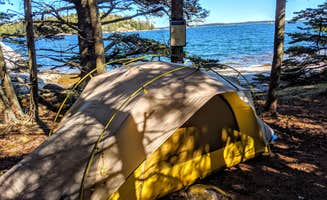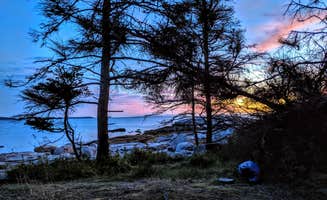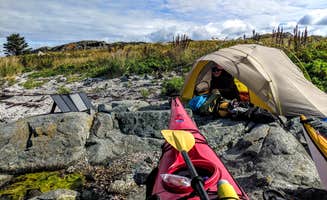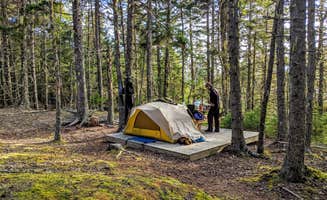Dispersed camping near Camden, Maine primarily involves remote island sites in the Deer Isle Archipelago. These boat-accessible locations require navigation skills, proper equipment, and adherence to leave-no-trace principles. The islands feature primitive camping conditions with varying landing difficulties depending on tides and weather conditions. Most sites operate on a first-come, first-served basis for Maine Island Trail Association members.
What to do
Water exploration opportunities: Buckle Island serves as an excellent starting point for kayakers new to island camping. According to one camper, "This is a perfect island for those new to sea kayak camping as the sandy shore, which is exposed for a good portion of the day, is easy to land on and a short walk to a trail into the woods."
Island hopping: Plan multi-day paddling routes connecting multiple islands. The proximity of these dispersed sites allows campers to experience different island environments. From Wheat Island, visitors can explore nearby Isle au Haut, part of Acadia National Park. A visitor notes, "Perfect island for exploring the close-by Isle au Haut, a remote section of Acadia National Park, but very hard to get reservations at Duck Harbor Campground."
Beach combing: Several islands feature distinctive shorelines worth exploring. Doliver Island offers a "gorgeous shell covered beach and a beautiful view of Isle au Haut, just next door," according to one visitor who used it as "a good stop for us on our 9 day journey and a perfect launching spot for crossing Jericho Bay (4.5 miles) to Marshall Island the next day."
What campers like
Accessibility options: Some islands provide easier access points than others. Buckle Island features two camping areas with different characteristics: "one larger area up in the woods, the other quite small near the granite shore, but both accessible from the east side of the island."
Sunset views: Strategic campsite selection rewards visitors with exceptional evening views. Wheat Island campers appreciate that the larger southwest site provides "a gorgeous view of the sun setting and full moon rising."
Relative solitude: The remote nature of these islands limits visitor numbers. Sites typically accommodate small groups, though capacity varies. Doliver Island is particularly limited, described as "small with barely a tent space," making it suitable for solo campers or very small groups.
What you should know
Water and waste management: No fresh water sources exist on these islands. As one Marshall Island visitor advises, "Come prepared with fresh water (there is no fresh water for filtering) and wag bags (no toilets). If you happen to need a food or water resupply, Swan's Island is a short paddle away and has a very small grocery store and town office with fresh water."
Membership requirements: Island access is tied to Maine Island Trail Association membership. Sites are "completely free for MITA members" but require proper registration and adherence to organization guidelines.
Insect conditions: Mosquito activity varies by island and season. A Wheat Island camper warns, "We thought we were passed mosquito season in early September, but alas, they were pretty bad at sunset." In contrast, some locations report fewer insects: "Despite the fact that the other islands had pesky mosquitoes, [Marshall Island] had none."
Tips for camping with families
Site selection: Choose islands with more stable landing conditions for family trips. Buckle Island provides a "sandy shore, which is exposed for a good portion of the day," making it more accessible for groups with children or less experienced paddlers.
Conservation opportunities: Engage children in environmental stewardship. Some islands offer incentives for helping maintain the areas. On Marshall Island, "if you do a beach clean-up during your stay and send in a picture, you will receive a Maine Coast Heritage Trust hat!"
Landing timing: Plan arrivals around tide schedules when camping with families. Several islands present landing challenges at high tide. A Wheat Island visitor cautions, "This can be a tricky island to land on at high tide, so plan accordingly."
Tips from RVers
Alternate accommodations: The boat-access-only nature of these sites means RVs cannot reach any dispersed camping islands. RVers must either secure mainland accommodations and make day trips by boat, or completely switch camping modes for island stays.
Equipment logistics: RVers planning to visit islands must arrange kayak or small boat rentals or transport their own vessels. Storage of RVs during island excursions requires advance planning for secure parking locations near boat launch sites.





